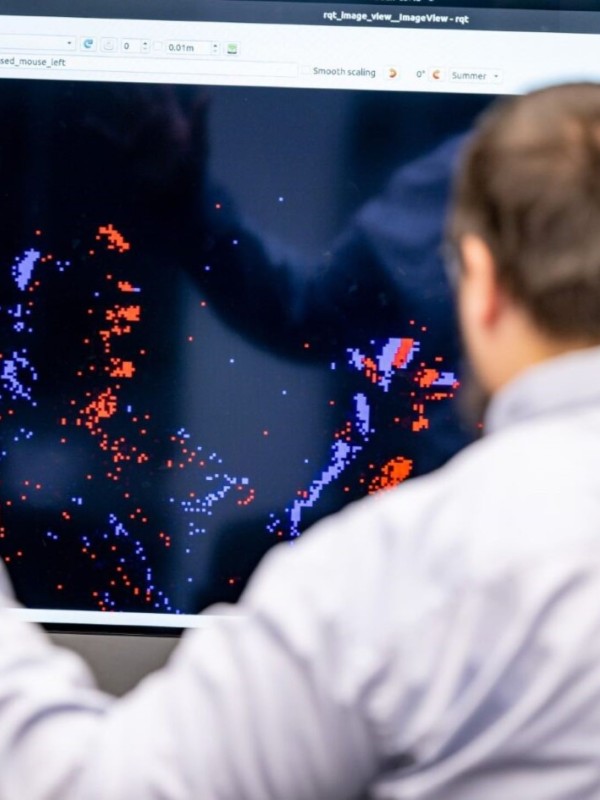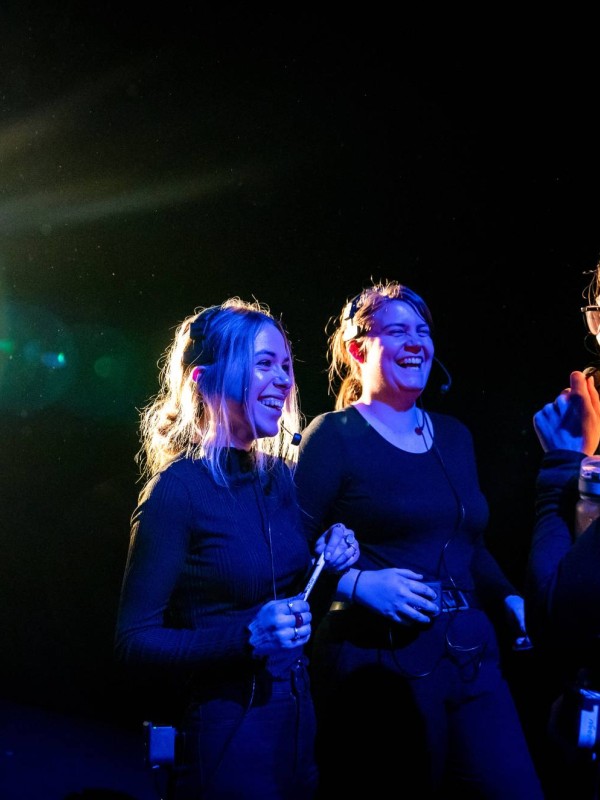
- Film, Animation and Digital Arts
MA — 2025 entry Film, Animation and Digital Arts
Our MA in Film, Animation and Digital Arts is a broad multidisciplinary programme which responds to the latest advancements in moving image production technologies such as virtual production, performance capture and synthesis, and real-time visual effects.
Why choose
this course?
- Our programme seeks to develop your core creative competences in a range of relevant contemporary practices, from 3D computer graphics to machine vision, interactive cinema to 'immersive' media.
- Your skills and talents as a media practitioner, alongside intellectual curiosity, collaborative spirit, technical proficiency and sense of adventure, will all come into play as you make use of Surrey’s state-of-the-art facilities, great workspaces and dedicated multi-disciplinary supervision.
- We enable you to innovate and experiment creatively and technologically in film, animation, digital arts and related areas of contemporary arts and media practices.
- You will also benefit from the extensive connections we enjoy with the creative industries, which include media production companies, animation studios, VFX houses, facilities providers and film studios – locally, nationally and globally.
Statistics
Top 10
Surrey is ranked 9th in the UK for overall satisfaction (Postgraduate Taught Experience Survey 2023)
Fantastic graduate prospects
100% of Music and Media postgraduate students go on to employment or further study (Graduate Outcomes 2024, HESA)
Award-winning team
Created by the team behind the course, the film 'Remember the Future' won 'Best Environmental Film' at the Cannes World Film Festival 2023
What you will study
Our programme is primarily practice-oriented, backed up with a relevant and robust contextual framework. The programme is 12 months long, split across two semesters and the University’s summer period.
Semester 1 includes a set of focused workshops designed not only to consolidate existing practical skills in script development, film production, animation, CG and VFX but also to bring you rapidly up to speed in less familiar areas such as virtual production, game engines, and digital cinematography. These are accompanied by a thorough grounding in contemporary moving image theory and practice. You will then work on a collaborative, multidisciplinary production project, which provides a great opportunity to work together in a small team on an exciting creative brief.
In Semester 2 you will develop a creative specification for your final project. Alongside this, specialist workshops and tutorials are offered to equip you with any specific techniques you might need.
During the University’s summer period, you will complete your final project, with regular supervision and mentoring provided by our academics, industry based visiting tutors and associates.
Location and connections
Our Guildford location is not only a short train journey from central London but is also a media production hub in its own right. Major film studios are nearby, and the town itself is home to a vibrant video games development community, alongside animation houses and design agencies. Notable players include:
- Supermassive
- MediaMolecule
- Electronic Arts
- Figment Productions
- BlueGFX
- Criterion.
We regularly enjoy visits and engagements with the London film production and VFX community, which includes:
- Framestore
- Moving Picture Company
- Blue Zoo
- Nexus
- Milk VFX
- KeyFrame Studios.
We also maintain close links with the British Film Institute, BAFTA, Animation UK, Visual Effects Society, SIGGRAPH London, UKIE and plenty of other important industry networks with whom you can connect.
On campus, we share a building and frequently collaborate with the prestigious Guildford School of Acting. We also work closely with colleagues from Surrey’s engineering programmes and have found touch points in many other departments across the University. In addition to this, we are actively building relationships with other institutions both close at hand and around the world; our approach is one of open collaboration wherever possible across all sections of the arts, culture and technology communities.
The structure of our programmes follows clear educational aims that are tailored to each programme. These are all outlined in the programme specifications which include further details such as the learning outcomes:
Please be aware: the course content and modules listed for this course are subject to change for the 2024/25 academic year, whilst we undertake a curriculum design review. Please contact the programme leader if you have any queries about the course.
Modules
Modules listed are indicative, reflecting the information available at the time of publication. Modules are subject to teaching availability, student demand and/or class size caps.
The University operates a credit framework for all taught programmes based on a 15-credit tariff, meaning all modules are comprised of multiples of 15 credits, up to a maximum of 120 credits.
Course options
Year 1
Semester 1
Compulsory
This module is about consolidating students’ existing skills and talents, and enhancing these with areas of creative media production in which they may be less familiar. The intention is to develop a broad armoury of aptitudes and proficiencies, enabling students to realise an expanded range of contemporary media projects, drawing on both traditional and evolving future techniques and technologies. To achieve this, students undertake a series of specialist workshops which span contemporary narrative media production, with an emphasis on current innovative techniques. The module will be assessed through the development of a cumulative portfolio. Students submit outputs from the workshops as a portfolio and accompany this with a reflective synopsis on their learning and development. The skills and knowledge acquired in this module are cumulative and can be applied to subsequent modules and workshops over the course of the Masters programme.
View full module detailsSemester 2
Compulsory
This module runs as a continuation from Creative Media Practices (I), and offers a range of specialist workshops in important emerging techniques in moving image media production. This enables students to further develop their proficiencies in film, animation and digital media arts production methods, and in particular explore new techniques in audiovisual content creation such as virtual production, real-time rendering, procedural animation, performance capture, and generative AI. Students will also be instructed in state-of-the-art VFX tools and technologies, encountering and consolidating skills in compositing packages such as ‘Nuke’, and Da Vinci Resolve Fusion. Students will also become familiar with tools such as the Unreal Engine, which is increasingly becoming a powerhouse in film and animation rendering. Students also use this module to advance particular skills and develop novel production techniques where required, informed by the needs and challenges of their ongoing final project development. Projects at this level usually involve a not insignificant degree of research and development, and this module can accommodate exploration and skills development in any newly identified tool or technique not previously encountered. This may include evolving research areas, such as automated digital character animation, applied ‘denoising diffusion probabilistic models’ (such as Stable Diffusion), or location-based interactive installation and augmented reality techniques.
View full module detailsSemester 1 & 2
Compulsory
This module engages with theoretical and cultural contexts for film, animation and digital arts. We do this not only by critically analysing current and future developments, but also by situating these within historical and philosophical debates and dialogues around creative arts in practice and creativity in general. Initial lectures will provide sessions on Research Methods for the Creative Arts, with a focus on the moving image. Some of these sessions will be drawn from the final year curriculum of the Digital Media Arts BA programme, and are likely to share content with its successor programme. Further sessions will explore contemporary debates reflecting this rapidly evolving area, and will be delivered by active researchers within the department and beyond. The output of the module will be a research paper which complements and contextualises forthcoming work on the Final Masters Project.
View full module detailsConsolidating existing skills and knowledge in practical production, outputs will consist of one or more group projects requiring collaboration both inside and outside of the MA FADA cohort. Where possible, projects developed will make use of latest contemporary media production technologies, such as Virtual Production, Real-Time Rendering, Interactive Video, and/or Virtual Character Creation. Teams will comprise groups of students from both within the MA cohort and in some case from other complementary MAs and final year UG programmes if and where appropriate. The skills applied to this module will be drawn both from students’ existing skills-base and from those developed in Creative Media Practices modules.
View full module detailsThis module spans the entirety of the MA FADA programme, representing the students’ cumulatively developed final creative project output(s). These projects can take many different forms and formats drawn from the multitude of film, animation and digital media arts production techniques explored and developed over the stages of the course. Students can also choose to undertake a research-oriented creative practice project, informed by both theoretical and practical aspects of the programme.
View full module detailsTeaching and learning
Your practical skills will be assessed through the development of a cumulative portfolio. This will be presented as response to and output from a series of creative and technical skills workshops in Semester 1.
We round off this part of the programme with a group project which involves multidisciplinary collaboration along with technical and creative experimentation.
Complementary theory lectures and seminars will be delivered by active practitioners and researchers from within the department and beyond, including those from our own postgraduate researchers.
Advanced skills development is offered to support your final project in areas which can include:
- Writing and screenplay development
- Character creation
- Cinematography
- Editing
- Animation
- Directing performance
- 3D animation
- VFX
- Game engines
- AI assisted content creation.
These advanced techniques will continue to contribute to the development of your final masters project through the on-going creation of prototypes, work-in-progress outputs and shorter portfolio test pieces.
General course information
Contact hours
Contact hours can vary across our modules. Full details of the contact hours for each module are available from the University of Surrey's module catalogue. See the modules section for more information.
Timetable
Course timetables are normally available one month before the start of the semester.
New students will receive their personalised timetable in Welcome Week, and in subsequent semesters, two weeks prior to the start of semester.
Please note that while we make every effort to ensure that timetables are as student-friendly as possible, scheduled teaching can take place on any day of the week (Monday – Friday). Wednesday afternoons are normally reserved for sports and cultural activities. Part-time classes are normally scheduled on one or two days per week, details of which can be obtained from Academic Administration.
Location
This course is based at Stag Hill campus. Stag Hill is the University's main campus and where the majority of our courses are taught.
We offer careers information, advice and guidance to all students whilst studying with us, which is extended to our alumni for three years after leaving the University.
The programme will provide you with an accelerated career path into numerous areas of the film, television and interactive media sectors, equipping you with sought-after skills and experience in these exciting fields. On successful completion of the course, your creative aptitude will be matched by technical acuity in whichever areas you have chosen to specialise.
The programme also provides a valuable springboard for extended postgraduate research on our own PhD programme or indeed should you choose to pursue your research elsewhere.
100 per cent of our Music and Media postgraduate students go on to employment or further study (Graduate Outcomes 2024, HESA)
We have doubled the facilities space, and our Performing Arts Technology Studios have been upgraded and complemented by a £1.7m investment in state-of-the-art production and media suites.
Our students have access to a wide range of professional film, audio, video, and digital production facilities, including:
- Computing facilities based around high-end GPUs
- Fibre connected film and television studios
- Motion / performance capture facilities
- 4k and 12K cine cameras and lenses
- Lighting, sound and grip equipment
- Photogrammetry
- Film and sound editing software
- State of the art production software
- Extensive fast media storage
- VR/AR/MR/XR head mounted displays.


Teodora
Student - Film, Animation and Digital Arts (FADA) MA
"...if you want a vibrant, all positive vibes place that will teach you a lot – this is MA FADA."


Hesam Abbasi
Student - Film, Animation and Digital Arts MA
If you're thinking about studying the course, don’t hesitate for a moment, as it will definitely change your life.
UK qualifications
A minimum 2:2 UK undergraduate degree (or international equivalent) usually, but not necessarily, in a relevant subject area.
Applicants are required to submit a portfolio of relevant work. Portfolio material usually consists of a showreel or a selection of your best work in the media and formats in which you have previously worked. Depending on the extent to which you have specialised, this could include examples of film, animation, 3D modelling, VFX, motion graphics, illustration, creative photography, scriptwriting, digital artworks, painting, sculpture, set design, live theatre work, installation, or indeed any other creative work which you feel demonstrates relevant skills and creativities.
You are also required to include a brief description of the type of project you would like to undertake on the MA. This helps us to understand your interests and likely requirements - it will not commit you to a particular project at this stage.
We may be able to take relevant work experience into consideration if you don't meet the typical entry requirements. You are welcome to contact the Programme Director to discuss your suitability for the programme prior to submitting an application.
English language requirements
IELTS Academic: 6.5 overall with 6.0 in each element.
These are the English language qualifications and levels that we can accept.
If you do not currently meet the level required for your programme, we offer intensive pre-sessional English language courses, designed to take you to the level of English ability and skill required for your studies here.
Selection process
Shortlisted candidates may be invited to an informal (online) interview/discussion with one of the programme team. This is to ensure that the course is a good fit for you and that you are a good fit for the course.
Recognition of prior learning
We recognise that many students enter their course with valuable knowledge and skills developed through a range of ways.
If this applies to you, the recognition of prior learning process may mean you can join a course without the formal entry requirements, or at a point appropriate to your previous learning and experience.
There are restrictions for some courses and fees may be payable for certain claims. Please contact the Admissions team with any queries.
Scholarships and bursaries
Discover what scholarships and bursaries are available to support your studies.
Fees per year
Explore UKCISA’s website for more information if you are unsure whether you are a UK or overseas student. View the list of fees for all postgraduate courses.
September 2025 - Full-time - 1 year
- UK
- £10,900
- Overseas
- £19,900
- These fees apply to students commencing study in the academic year 2025-26 only. Fees for new starters are reviewed annually.
Payment schedule
- Students with Tuition Fee Loan: the Student Loans Company pay fees in line with their schedule (students on an unstructured self-paced part-time course are not eligible for a Tuition Fee Loan).
- Students without a Tuition Fee Loan: pay their fees either in full at the beginning of the programme or in two instalments as follows:
- 50% payable 10 days after the invoice date (expected to be October/November of each academic year)
- 50% in January of the same academic year.
- Students on part-time programmes where fees are paid on a modular basis: cannot pay fees by instalment.
- Sponsored students: must provide us with valid sponsorship information that covers the period of study.
The exact date(s) will be on invoices.
Funding
You may be able to borrow money to help pay your tuition fees and support you with your living costs. Find out more about postgraduate student finance.
Apply online
To apply online first select the course you'd like to apply for then log in.
Select your course
Choose the course option you wish to apply for.
Sign in
Create an account and sign into our application portal.
Please note that we may have to close applications before the stated deadline if we receive a high volume of suitable applications. We advise you to submit your application as soon as it is ready.
ApplyAdmissions information
Once you apply, you can expect to hear back from us within 14 days. This might be with a decision on your application or with a request for further information.
Our code of practice for postgraduate admissions policy explains how the Admissions team considers applications and admits students. Read our postgraduate applicant guidance for more information on applying.
About the University of Surrey
Need more information?
Contact our Admissions team or talk to a current University of Surrey student online.
Terms and conditions
When you accept an offer to study at the University of Surrey, you are agreeing to follow our policies and procedures, student regulations, and terms and conditions.
We provide these terms and conditions in two stages:
- First when we make an offer.
- Second when students accept their offer and register to study with us (registration terms and conditions will vary depending on your course and academic year).
View our generic registration terms and conditions (PDF) for the 2024/25 academic year, as a guide on what to expect.
Disclaimer
This online prospectus has been published in advance of the academic year to which it applies.
Whilst we have done everything possible to ensure this information is accurate, some changes may happen between publishing and the start of the course.
It is important to check this website for any updates before you apply for a course with us. Read our full disclaimer.








